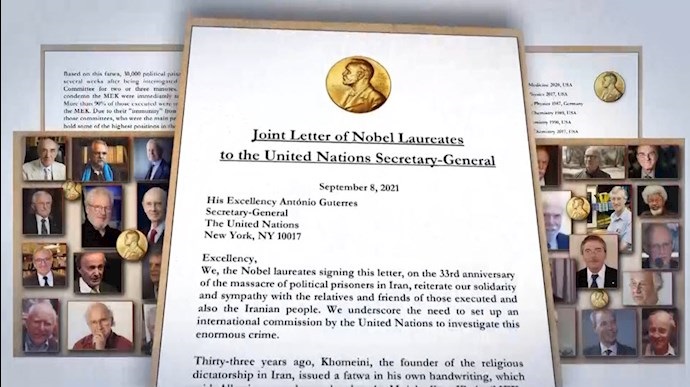
The National Council of Resistance of Iran (NCRI) reported that 25 Nobel Prize laureates have addressed a letter to the United Nations Secretary-General, Antonio Guterres to express their support and sympathy to the families of the victims of the 1988 massacre.
Following a fatwa issued by then-Supreme Leader, Ruhollah Khomeini, the executions of 30,000 political prisoners were ordered and took place over a course of 3 months in the summer of 1988. The Nobel laureates called on the United Nations to set up an international commission tasked with investigating this horrific crime against humanity.
The NCRI said, “They cited statements by Amnesty International and other human rights organizations stating that Ebrahim Raisi, the then-Deputy Prosecutor of Tehran, was part of the four-member Death Committee in Tehran. This committee executed thousands of prisoners who were members of the MEK along with several hundred prisoners affiliated with other groups in Evin and Gohardasht prisons.”
Addressing Guterres as ‘Excellency’, the letter began with the laureates sending their ‘solidarity and sympathy with the relatives and friends of those executed and also the Iranian people’, and the reiteration of the need for an international investigation into the 1988 massacre.
They discussed how ‘the founder of the religious dictatorship in Iran’, Ruhollah Khomeini issued a fatwa 33 years ago that outlined that those prisoners who remained loyal to the People’s Mojahedin Organization of Iran (PMOI/MEK) were considered ‘Mohareb’ (one who wages war on God) and they should be executed.
The laureates said, “Based on this fatwa, 30,000 political prisoners were executed over several weeks after being interrogated by the so-called Death Committee for two or three minutes. Those who refused to condemn the MEK were immediately sent to the execution hall. More than 90% of those executed were members and supporters of the MEK.”
The men who held positions in the ‘death commissions’ were the main perpetrators of the massacre and because of their ‘immunity’ from punishment for their involvement, they now hold some of the highest positions within the Iranian regime.
The letter went on to explain how the fact that Ebrahim Raisi, who was one of the main perpetrators in the massacre, has now been inaugurated as the new president of Iran, heightens the need for an International Commission of Inquiry to be formed to hold him and other officials accountable.
The laureates said, “In the absence of international accountability, genocide and crimes against humanity persist in Iran. Among these are the continuation of political executions and the murder of at least 1,500 young protesters in November 2019.”
The letter ended with, “The regime’s attempts to conceal the fate of the victims from their families, to minimize the number of executions, and to hide the victims’ affiliation with the MEK, only add to the mullahs’ criminal record.”
Among the 25 signatories of the letter, 18 laureates were from the USA, 2 from Germany, 1 with dual citizenship of the USA and Israel, and the remaining 4 were from Canada, East Timor, Nigeria, and Norway.